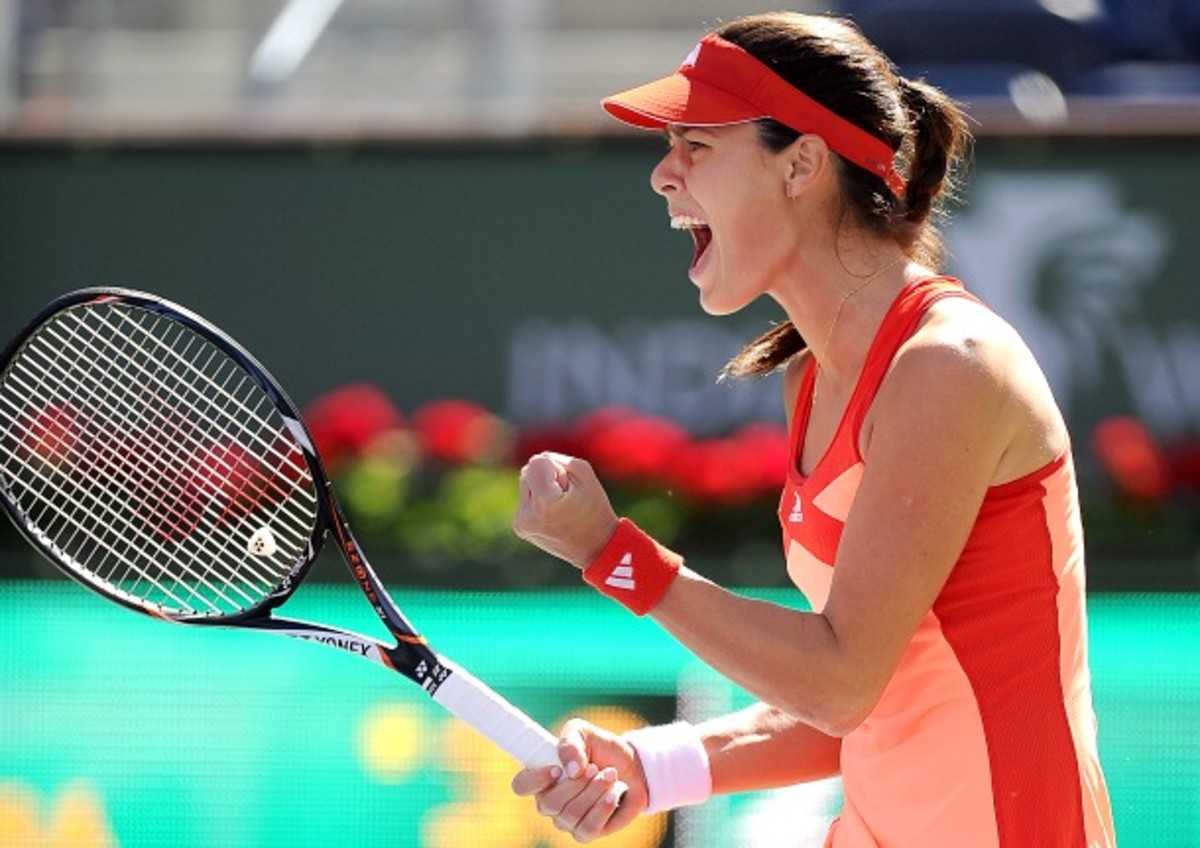One forehand at a time, Ana Ivanovic rediscovering form in Indian Wells


Since reaching No. 1 after the 2008 French Open, Ana Ivanovic tumbled out of the top 20 by the end of the year and hasn't again reached a Grand Slam quarterfinal.
INDIAN WELLS, Calif. -- Ana Ivanovic's career has been defined by truths and consequences. The truths have always been plain to see. A quietly emotional player, she's got a beautifully-timed forehand that's as natural to her as speed-talking through interviews. That forehand and a competitive instinct -- one we see after almost every point with her unwavering flurry of fistpumps -- rocketed her to the top of the game in 2008 when she grabbed the Roland Garros title and snagged the No. 1 ranking all in one dreamy weekend. That run wasn't a fluke. Ivanovic had already made two Grand Slam finals, at the Australian Open and French Open, as well as a Wimbledon semifinal. The truth was, Ivanovic, fresh-faced and almost accidentally charismatic, was well-positioned to be firm fixture in the top five.
But then the consequences. Feeling the weight of the bullseye on her back, Ivanovic decided to play through a thumb injury she sustained a month after winning Roland Garros, a decision she regrets. Ivanovic flew to Beijing for the Olympics, only to withdraw, then suffered early-round losses in Montreal and the U.S. Open. "I was doing so well, and I never really had big disappointment," Ivanovic recalled to reporters this week at Indian Wells. "So I felt like, 'Oh, I can do anything. I can even play with one hand.' I think it affected a bit my confidence, especially with all the expectations as the world No. 1."
Which leads me to another truth: Ivanovic hasn't been the same player since.
It's been a hard road back for the 24-year-old Serb. Other players going through a rough patch might be able to do so in relative anonymity. Ana Ivanovic didn't have that luxury. When asked whether she had any advice for Caroline Wozniacki about dealing with the loss of the top ranking, Ivanovic laughed. "Maybe they can give me advice. Maybe I'm not the right person to ask that question."
The fall has been dramatic for Ivanovic and she had to spend week after week responding to interview requests, fielding questions from reporters all around the world as to why she could barely put the ball in the court. She dropped out of the top 60 in 2010, leading to coaching changes being scrutinized, fitness regimes questioned and every press conference turning into an intense therapy session. To her credit (and possibly her detriment) Ivanovic fielded every inquiry with a level of honesty and introspection that often left her on the verge of tears. Unlike many on the WTA, the Serb isn't one to sidestep a question. For better or worse, she took her beating.
"They say experience is a good thing and you learn from your experiences, but when you're young and upcoming you don't have these experiences. You don't know what to expect or what the consequences are. You just go with it. [Experience] helps you at some points, but also it sometimes creates a doubt. You know, because you analyze and think too much."
Through it all, Ivanovic kept working and tried to find solutions. That solution came in the form of Nigel Sears, formerly the head of women's tennis at the LTA. Sears has taken Ivanovic back to basics and together they're building her game back up again. While most coaches went straight to trying to fix her serve, Sears focused on getting Ivanovic's biggest weapon, her forehand, back on track. The work is paying off. This week Ivanovic has been hitting her forehand better than she has in a few years, moving well to the ball and accelerating and finishing the hit. When Ivanovic is hitting her running forehand back across the court with pace you know she's hitting through the ball, and she did that shockingly well in her win quarterfinal win over Marion Bartoli. Rediscovering her main weapon has opened up the rest of her game. Her toss is still from moon to Mars, but she's serving well. Her technically deficient backhand has been less of a liability and she's been confident enough to step into it and go for winners, a hallmark gauge of Ivanovic's confidence. And she's playing great hardcourt defense when she has to, something she did particularly well when she made the Australian Open final in 2008.
[polldaddy poll=6044957]
Speaking of that final, Indian Wells will see the first meeting between Ivanovic and Maria Sharapova since that 2008 match in Melbourne. Back then it was tagged "The Glam Slam" pitting Blonde vs. Brunette, Ice vs. Nice, Shrieker vs. Squeaker. That match turned on one ill-fated dropshot Ivanovic hit on a point that could have given her two set points in the first set. Instead, it fell into the net and Sharapova roared from there, winning 7-5, 6-3. "Oh, my God," Ivanovic laughed. "I remember how much I cried afterwards. It still hurts me so much. Silly dropshot forehand. I was like, Why? Seriously, why?"
That's Ivanovic these days. She's learned to embrace the dark moments, laughing them off with equal parts self-deprecation and sarcasm. She's happier, confident, and even if she loses to Sharapova in the semifinal, this is the best tournament she's played since she won Roland Garros in 2008. She's scored back-to-back wins over top 10 players for the first time since Rome in 2010, and the 6-3, 6-2 win over Wozniacki may have been her biggest win since beating Jelena Jankovic for the No. 1 ranking in the 2008 Roland Garros semifinals.
